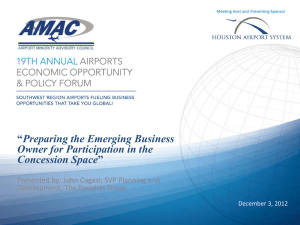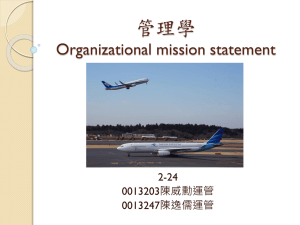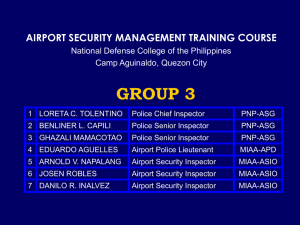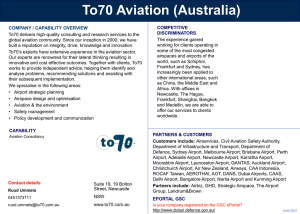1- Denari
advertisement
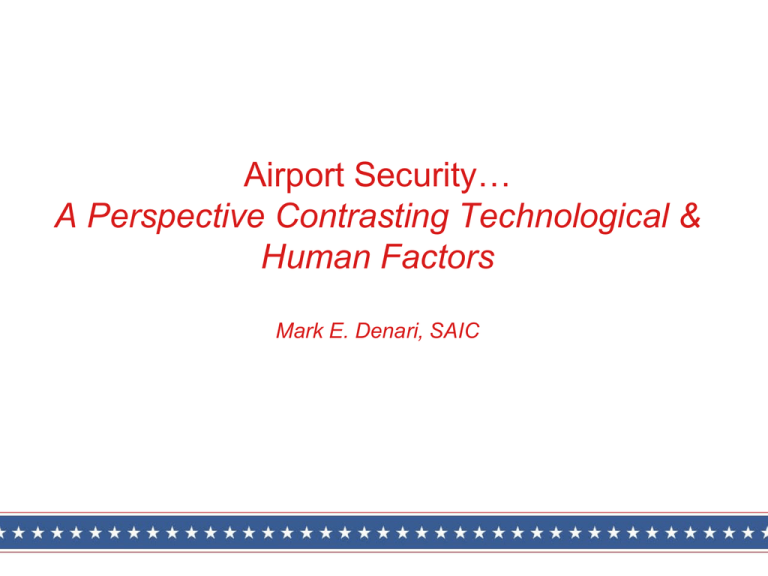
Airport Security… A Perspective Contrasting Technological & Human Factors Mark E. Denari, SAIC Airport Security – Post 9/11 The Environment – I • Threats to U.S. air transportation system, commercial aviation and airports remain high • Aircraft – still No. 1 target • Terminals and facilities – also prime target • Aviation security continues to be proactive, responsive and evolving to counter potential and emerging threats • Integrators and government continue to “push” technology providers to develop products to improve and enhance security • Some technologies developing more rapidly than others Airport Security – Post 9/11 Statutory Regulations • General • TSA and airports must provide for safety and security of persons and property on an aircraft operating in air transportation or interstate air transportation against an act of criminal violence, aircraft piracy, and the introduction of an unauthorized weapon, explosive or incendiary onto an aircraft TSA = Transportation Security Administration Airport Security – Post 9/11 Statutory Regulations (cont’d) • TSA • Technologically and/or physically screen all passengers and property to ensure that threat objects and/or prohibited items do not enter airport’s sterile area • Airport – 49 CFR Part 1542 • Airport operator must prevent and detect unauthorized entry, presence, and movement of individuals and ground vehicles into and within securitycontrolled areas Airport Security – Post 9/11 Improvements and Enhancements • TSA • Checked Baggage Inspection Systems – “in-line” EDS • Advanced technology (AT) deployment – X-ray & whole body imaging (WBI) • Federal Screening Force – better trained and more aware EDS = Explosives Detection Systems Airport Security – Post 9/11 Improvements and Enhancements (cont’d) • Airports • Security systems – upgrades • Video Surveillance System (VSS) – analog to digital • Access Control System (ACS) – more efficient and capable • Physical Security Information Management (PSIM) – very limited deployment • Perimeter Intrusion Detection Systems (PIDS) – very limited deployment • Credentialing and identity management – coming onboard • Personnel – better understanding and more aware Airport Security – Post 9/11 The Environment – II • TSA • 100 percent EDS screening of all checked baggage • Passenger Screening Checkpoint – detect weapons, explosives & other potential threat objects (remove capability) • Screening/Inspection personnel – TSO, BDO, K-9, TSI, other EDS = Explosives Detection Systems Airport Security – Post 9/11 The Environment – II (cont’d) • Airports • Security systems/technology • ACS – effective card or smart card access system • VSS – monitoring & forensics • Airport Security Program (ASP) • TSA-approved to comply with AVSEC regulations, policies & procedures • Provides direction & guidelines for security operations • Security Operations • Airport personnel, law enforcement & contract security personnel • Patrols, random inspections, access control monitoring, other • ASP participants - Airport, air carriers, non-aviation tenants, contractors & others Airport Security – Post 9/11 The Environment – III • Security environmental conditions – all airports • • • • • • 1 – Airfield perimeter (fence or barrier) 2 – Perimeter vehicle access gates (to security controlled area) 3 – Terminal employee access doors (to security controlled area) 4 – Passenger screening checkpoints (to sterile area) 5 – Terminal lobby areas (public area) 6 – Terminal curbs and roadways • Airport operator … must prevent and detect unauthorized entry of persons and/or vehicles – conditions 1, 2 and 3 • TSA … condition 4 • Conditions 5 and 6 – major challenges Airport Security – Post 9/11 Contrasting Security “Apparatus” • Passenger and property screening (TSA responsibility) – Condition 4 • Threat prevention and detection – technology “centric” • Advanced technology (AT) deployed at passenger screening checkpoints • Airport security (airport – operator responsibility) – Conditions 1,2 and 3 • Threat prevention and detection – human “centric” • Security system – physical security, ID display, challenging, awareness and training • Little, if any, effectiveness with advanced technologies – ACS and VSS ACS = Access Control System VSS = Video Surveillance System Airport Security – Post 9/11 Challenges • Controlling access at terminal and perimeter gate access points • Rely heavily on human performance – accessing and securing doors and gates • Potential for human failure • Preventing and detecting unauthorized access to security controlled areas • Rely heavily on human involvement and awareness • “System” challenged – most airside personnel involved in high-tempo air carrier operations • Very limited airport resources available for security operations Airport Security – Post 9/11 Addressing Challenges • Leverage existing, widely deployed, security systems and technologies • Specifically, Digital Video Surveillance System (DVMS) • Deployed at terminal employee access doors and perimeter vehicle access gates • Develop and implement advanced video analytics (VA) • Various algorithms detect behaviors related to security environmental conditions…”piggybacking,” loitering, object left behind, others • High probability of detection (PD) vs. low false-alarm rate (FAR) • Shifts Video Surveillance System (VSS) from monitoring system to detection system • Security force multiplier Enhancing Detection – Video Analytics Terminals: VSS/VIDEO ANALYTICS, ACS, biometrics Airside/Perimeter: PIDS - VSS/VIDEO ANALYTICS Vehicle Intrusion Human “Tailgating” Suspicious Vehicle Loitering Inside Public Areas: VSS/VIDEO ANALYTICS Landside/Roadways: VSS/VIDEO ANALYTICS, data sensors ACS = Access Control System VSS = Video Surveillance System PIDS = Perimeter Intrusion Detection Systems Airport Security – Post 9/11 Final Points • Video analytic companies need to “push the envelope”… we can do this! • Government, integrators/solutions companies, technology providers – need to work collaboratively and proactively • Have vision and mission – “the art of the possible” • Constantly assess current and emerging threats • Strive to increase reliance on technology and decrease it on humans • Continue to champion funding support from internal and external sources

